

New Economics Series: Part IV. Leaving Facebook. Don’t Be Scared About The End Of Capitalism—Be Excited To Build What Comes Next. This story reflects the views of these authors, but not necessarily the editorial position of Fast Company.

These are fast-changing times. Old certainties are collapsing around us and people are scrambling for new ways of being in the world. As we pointed out in a recent article, 51% of young people in the United States no longer support the system of capitalism. And a solid 55% of Americans of all ages believe that capitalism is fundamentally unfair. But question capitalism in public and you’re likely to get some angry responses. Socialism in America Is Closer Than You Think.
In 1970, the great liberal economist John Kenneth Galbraith declared that the “Democratic Party must henceforth use the word ‘socialism.’
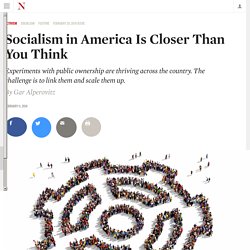
It describes what is needed.” Like many others, however, Galbraith largely dropped the subject in subsequent years. The response to Bernie Sanders’s insurgent presidential campaign, along with polls showing that large numbers of young people and minorities in America have a positive view of socialism, suggest that this once-forbidden concept may no longer be taboo. More than 40 percent of Americans under the age of 30 view socialism favorably, according to the most recent YouGov poll. Positive responses among black Americans have ranged between 29 and 41 percent in recent surveys. What is New Economic Thinking? By Amna Silim The financial collapse of 2007/08 and the subsequent deep recession and sluggish recovery have left huge scars on the global economy.
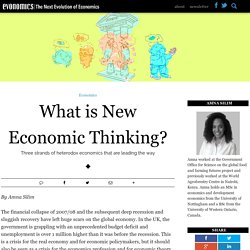
In the UK, the government is grappling with an unprecedented budget deficit and unemployment is over 1 million higher than it was before the recession. This is a crisis for the real economy and for economic policymakers, but it should also be seen as a crisis for the economics profession and for economic theory. Not only did mainstream neoclassical economics – which has been the overwhelmingly dominant strand in economic thinking for over a century – fail to predict the collapse and recession, its models do not even concede that such events could happen. In the future, there is bound to be more interest in economic theories that offer a better explanation of recent events; and this is where heterodox economics comes in. Neoclassical Economics Get Evonomics in your inbox Complexity, evolutionary and behavioural economics References 2017 August 19. After Capitalism. How will it end?
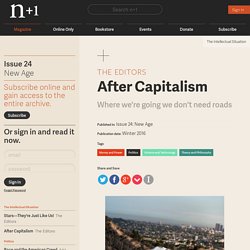
For centuries even the most sanguine of capitalism’s theorists have thought it not long for this world. Smith, Ricardo, and Mill pointed to a “falling rate of profit” linked to inevitable declines in agricultural productivity. Marx applied the same concept to industrial production, suggesting that the tendency to replace workers with machines would lead to a chronic and insurmountable lack of demand. The end of capitalism has begun. Thinking about a next system with W.E.B. Du Bois and Fannie Lou Hamer - The Next System Project. A Black cooperative in Memphis, Tennessee, circa 1919.
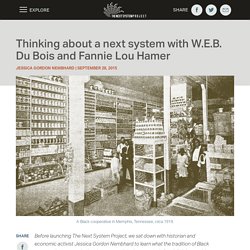
Before launching The Next System Project, we sat down with historian and economic activist Jessica Gordon Nembhard to learn what the tradition of Black cooperative economic development and the long struggle for civil rights could teach us about system change and system models. What follows is an edited transcript of that conversation. Keane Bhatt, The Next System Project (KB): Thank you for speaking with us. I was really excited to talk to you, because it seems that your intellectual and scholarly trajectory maps towards system change. Could you tell us a bit more about that trajectory, and how you began to tackle system-level questions?
Jessica Gordon Nembhard (JGN): I came from a family that was dedicated to social justice—a family that was very involved in trying to make social and economic change. KB: How does your deep grasp of history inform, and in some ways upend, the dominate worldview created by standard economic theory? Could a circular economy provide a solution to our current linear system? This short animated video by the Ellen MacArthur Trust looks at the demise of our linear economic system.
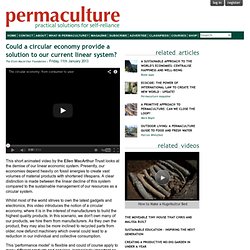
Presently, our economies depend heavily on fossil energies to create vast volumes of material products with shortened lifespans. A clear distinction is made between the linear decline of this system compared to the sustainable management of our resources as a circular system. Whilst most of the world strives to own the latest gadgets and electronics, this video introduces the notion of a circular economy, where it is in the interest of manufacturers to build the highest quality products. In this scenario, we don't own many of our products, we hire them from manufacturers. As they own the product, they may also be more inclined to recycled parts from older, now defunct machinery which overal could lead to a reduction in our individual and collective consumption.
Prepare yourself for transition with Permaculture. Paradigm Shift. Doughnut Economics: Creating a safe and just space for humanity. RSA Shorts - Growth is Not Enough. Can we live inside the doughnut? Why the world needs planetary and social boundaries. This blog summaries a new Discussion Paper published by Oxfam.

It does not represent Oxfam policy, but is intended to encourage public debate in the run-up to the UN conference on sustainable devolpment (Rio+20) in June. When crossing unknown territory, a compass can be pretty handy. Achieving sustainable development for nine billion people has to be high on the list of humanity’s great uncharted journeys. So here’s an idea for a global-scale compass to point us in the right direction (Fig 1). Fig 1. Source: Oxfam, inspired by Rockström et al (2009) What’s going on here? Putting excessive stress on these critical processes could lead to tipping points of abrupt and irreversible environmental change, so Rockström et al proposed a set of boundaries for avoiding those danger zones.
That’s a compelling approach to environmental sustainability, but humanity is glaringly absent from the picture. Gar Alperovitz - America Beyond Capitalism [Web] : Pirate TV Seattle. If You Don't Like Capitalism or State Socialism, What Do You Want? By Gar Alperovitz The very first book I wrote—my Ph.D. thesis, basically—was on the bombing of Hiroshima.
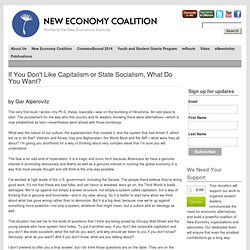
An odd place to start. The puzzlement for me was why this country and its leaders, knowing there were alternatives—which is now established as fact—nevertheless went ahead with those bombings. It's Time For Breakthrough Capitalism. There are periods of creative destruction when an old, dying order comes apart at the seams, opening up the space for a new order currently struggling to be born.
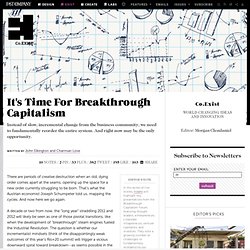
That’s what the Austrian economist Joseph Schumpeter told us, mapping the cycles. And now here we go again. The New-Economy Movement. The idea that we need a “new economy”—that the entire economic system must be radically restructured if critical social and environmental goals are to be met—runs directly counter to the American creed that capitalism as we know it is the best, and only possible, option.
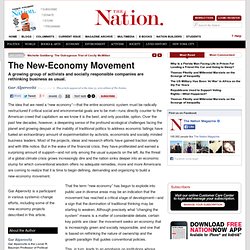
Over the past few decades, however, a deepening sense of the profound ecological challenges facing the planet and growing despair at the inability of traditional politics to address economic failings have fueled an extraordinary amount of experimentation by activists, economists and socially minded business leaders. Most of the projects, ideas and research efforts have gained traction slowly and with little notice. But in the wake of the financial crisis, they have proliferated and earned a surprising amount of support—and not only among the usual suspects on the left. Chilean Economist Manfred Max-Neef: US Is Becoming an "Underdeveloping Nation" Radical new economic system will emerge from collapse of capitalism. At the very moment of its ultimate triumph, capitalism will experience the most exquisite of deaths.
This is the belief of political adviser and author Jeremy Rifkin, who argues the current economic system has become so successful at lowering the costs of production that it has created the very conditions for the destruction of the traditional vertically integrated corporation. Rifkin, who has advised the European Commission, the European Parliament and heads of state, including German chancellor Angela Merkel, says: No one in their wildest imagination, including economists and business people, ever imagined the possibility of a technology revolution so extreme in its productivity that it could actually reduce marginal costs to near zero, making products nearly free, abundant and absolutely no longer subject to market forces. With many manufacturing companies surviving only on razor thin margins, they will buckle under competition from small operators with virtually no fixed costs.
Jeremy Rifkin: The Third Industrial Revolution. The Third Industrial Revolution: A Radical New Sharing Economy. Sleeping giants of economic shift change: Shane Hughes at TEDxLausanne. Peer-to-Peer Economy Thrives as Activists Vacate the System. Eric BlairActivist Post The Occupy Movement recently celebrated its second anniversary with very little fanfare leaving many to wonder where all the activists went. It seems they, and many anti-establishment activists, are vacating the system rather than occupying it. Progressives may call it the "sharing economy" while Libertarians may refer to it as Agorism - a "society in which all relations between people are voluntary exchanges by means of counter-economics, thus engaging in a manner with aspects of peaceful revolution.
" Whatever it's called, together, they're opting out of the current socioeconomic matrix and creating a new alternative economy where trading occurs peer-to-peer and increasingly without government-issued currency. It's a space where mutual trade occurs without burdensome taxes, regulations, or licenses. Websites like Ebay and Craigslist first made it possible for individuals to sell things or offer services online. The Economist describes this movement as follows: The open source revolution is coming and it will conquer the 1% - ex CIA spy. Robert David Steele, former Marine, CIA case officer, and US co-founder of the US Marine Corps intelligence activity, is a man on a mission. But it's a mission that frightens the US intelligence establishment to its core.With 18 years experience working across the US intelligence community, followed by 20 more years in commercial intelligence and training, Steele's exemplary career has spanned almost all areas of both the clandestine world.
Steele started off as a Marine Corps infantry and intelligence officer. After four years on active duty, he joined the CIA for about a decade before co-founding the Marine Corps Intelligence Activity, where he was deputy director. Planning a commons-based, peer production future for Ecuador. In 2013, the Government of Ecuador launched a major strategic research project to “fundamentally re-imagine Ecuador” based on the principles of open networks, peer production and commoning. Michel Bauwens, founder of the P2P Foundation would be leading the research team for the next ten months, and seeking to “remake the roots of Ecuador’s economy, setting off a transition into a society of free and open knowledge.” The announcement of the project was made in September, 2013, by the Free/Libre Open Knowledge Society, or FLOK Society, a project at the IAEN national university that has the support of the Ministry of Human Resource and Knowledge in Ecuador. The research project is focusing on many interrelated themes, including open education; open innovation and science; “arts and meaning-making activities”; open design commons; distributed manufacturing; sustainable agriculture; and open machining.
Here was the official announcement first released by the FLOK Society: Transition Plan. The elements of new economics? From the author of the Resilience Imperative. Complementary Economics/Sutainable Economies. The Economics of Happiness - Official Trailer. Stop Accumulating Stuff And Start Accumulating Experiences. The most important question you'll ever ask yourself—even more important than "sneakers or shoes?
", "what's for dinner tonight? ", or "should I stay or should I go? " The third great wave. MOST PEOPLE ARE discomfited by radical change, and often for good reason. Both the first Industrial Revolution, starting in the late 18th century, and the second one, around 100 years later, had their victims who lost their jobs to Cartwright’s power loom and later to Edison’s electric lighting, Benz’s horseless carriage and countless other inventions that changed the world. But those inventions also immeasurably improved many people’s lives, sweeping away old economic structures and transforming society.
They created new economic opportunity on a mass scale, with plenty of new work to replace the old. Beyond capitalism and socialism: could a new economic approach save the planet? To avoid social, environmental and economic collapse, the world needs to move beyond the standard choices of capitalism or socialism.